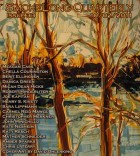Where did the idea for this story come from? And did the original idea change as you wrote it, or was this what you had planned from the get-go?
The story started with its final meditation on hand-holding. Months before I wrote “Exposure” I was out somewhere without my husband and thought how if he were with me we’d be holding hands. I noticed the couples around me who were doing this and the moment got me thinking. I sensed the germ of an idea to later explore in a story. I filed it away. Then, I began experimenting with short forms and wanted to write what I think of structurally as a baton-pass story. I didn’t know when I sat down to write “Exposure” that this would be the piece to contain the hand-holding idea. My goals at the start were mainly structural, and in that regard the story ended up being what I had intended. I really didn’t know what themes I wanted to explore until the writing began.
I really like your referral to a “baton-pass” story. Can you talk a little about the different shades of meaning the title “Exposure” gets as we move from person to person in this story?
I love this question. My hope is that readers of the story will enjoy considering or feeling this on their own, so I hesitate to say anything.
In your story, someone dies of exposure to the cold. What do you think would be a worse fate—freezing to death, or dying of heat in the middle of the desert?
I imagine exposure to heat would be especially painful. What I wonder, taking up this question, is which landscape would a person rather see right before she dies? If death is certain, and certain to be horrible, maybe the tragedy is softened if the last thing you see is something you find beautiful? (I know how hokey that sounds, by the way.)
Are you drawn to flash fiction as a form, or do you normally write longer?
I’m drawn to flash fiction but I often writer longer. Last year I started to write a novel and it made sense to me to write flash fiction alongside this larger project. Doing so has allowed me to play with ideas that excite me but don’t belong in the novel. The short-short demands a particular precision with images and language—I delight in this challenge and think trying to meet it is good conditioning for the writer’s brain. I’d say my novel draft has benefited from this.
What do you think has been your most impressive literary accomplishment to date?
I think my first workshop submission contained seventeen semi-colons, so maybe I should say recovering from semi-colon abuse is my biggest literary accomplishment. I felt accomplished when I completed my story “The Fawn Skull” last year. An early draft of this story was the first piece of fiction I ever seriously attempted to write (I used to write poems). That first draft was so bad! And I knew it, but I wanted to tell this story. At that time, the story’s ideas exceeded my ability to express them. But I stuck with it, and over a few years revised and revised until I produced a draft that said what I needed it to. So, the accomplishment is personal and literary, I suppose. PANK published the story in January 2011 and I was so, so pleased.




 The core workshop of SmokeLong Fitness is all in writing, so you can take part from anywhere at anytime. We are excited about creating a supportive, consistent and structured environment for flash writers to work on their craft in a community. We are thrilled and proud to say that our workshop participants have won, placed, or been listed in every major flash competition. Community works.
The core workshop of SmokeLong Fitness is all in writing, so you can take part from anywhere at anytime. We are excited about creating a supportive, consistent and structured environment for flash writers to work on their craft in a community. We are thrilled and proud to say that our workshop participants have won, placed, or been listed in every major flash competition. Community works.